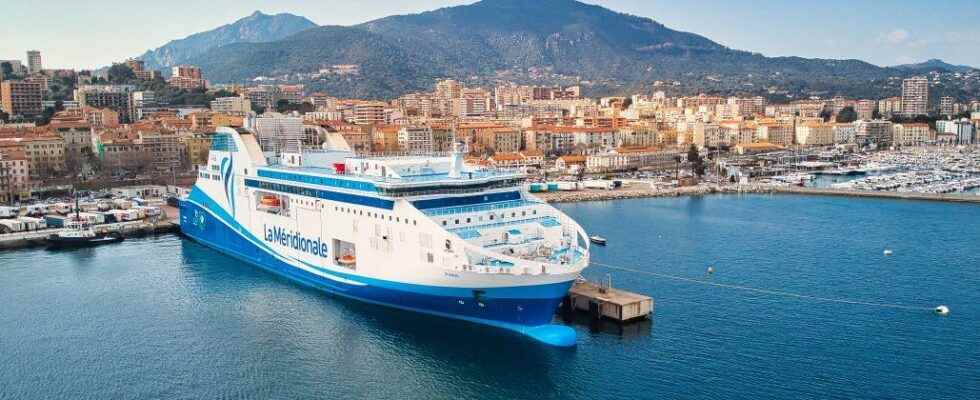the Pianoa La Méridionale ship, has a brand new filter that eliminates 99.9% of fine and ultrafine particles, the most dangerous to health.
It’s a “world premiere“, already hailed by an air monitoring body and environmental activists. In Marseille, the French company La Méridionale has launched a ferry guaranteed to be particle-free, a promising innovation in a sector weighed down by its carbon footprint. On the Pianothe flagship of La Méridionale operating between Corsica and Marseille, all the engines are now equipped with innovative filters, funny “socksin metal cylinders which neutralize part of the polluting emissions.
Not only does this particulate filter (Fap) presented Monday, September 5, after three years of tests, capture 99% of sulfur oxides – in accordance with the legislation – but it also eliminates 99.9% of fine and ultrafine particles, the most dangerous to human health. “They go much further than what is required by regulations, by treating all particulate emissions“says Damien Piga, innovation director of the regional air quality monitoring body Atmosud, who adds that he has “never heard of such projectseven through his collaborations in Europe and Asia.
Read alsoSea trip : launch of a new French company on the cruise market
“This is an unprecedented solution, a world first“, claimed Marc Reverchon, president of the company, aboard the Piano on which is written roughly “world’s first zero-particle ship“. “Until now to reduce the level of sulfur oxide in the fuel it was necessary either to have a less polluting fuel, or a ‘scrubber’, (system) which consists of ‘washing’ the fumes with sea water», Underlines Damien Piga of Atmosud. The “scrubbers”, placed in the chimneys of ships, are disputed because most shipowners are equipped with them opt for an open circuit, with discharge of pollutants at sea.
Ships docked
A pioneer in environmental matters, La Méridionale, which transports freight and passengers to Corsica or Morocco, already connected all its ships electrically to Marseille, “but that only concerned part of the operation of the ships, when they are at the quay“, explains Marc Reverchon, when 80% of emissions occur at sea. With the new filter, no more smoke comes out of the Piano, along its entire path. Its process has already been proven on land, for a long time, in thermal power stations for example: sodium bicarbonate injected at the engine outlet will react chemically on the particles present in the exhaust gases, then end up in a filter composed of bags, on which it will settle and capture particles and heavy metals.
“They’ve ‘marinized’ a proven land facility“, Estimated Guillaume Picard, ex-commander and chief mechanic, activist of the environmental collective “Stop cruises”. “The IMO does not impose anything in terms of fine particles, so just for that we can take our hats off to them“, concludes the activist. Moreover, in terms of regulations, Marc Reverchon is proud to have taken quite a head start, since “the Piano is already compliant with the standards that will come into force in 2025», in particular on the sulfur content of marine fuels which will be limited to 0.1% in the Mediterranean.
The big ones, the cruise lines will no longer have passengers on board if they do not make this evolution
The president of the Provence-Alpes-Côte d’Azur region, Renaud Muselier
The president of the Provence-Alpes-Côte d’Azur region, Renaud Muselier, who contributed 40% to the financing of the filter, felt that this initiative by a small company could inspire “the fats“, them “cruise passengers“: “They won’t have any more passengers on board if they don’t upgrade“. This summer, the black smoke from cruise ships, many in the port of Marseille, angered local residents, and even the mayor of the city Benoît Payan, who challenged the State and the IMO.
Activist Guillaume Picard has only one question: what will become of the waste produced by the new filter, tons of residue. La Méridionale’s response: the chemical company Solvay, which delivers the sodium bicarbonate, recovers the residue and bury it. But according to Christophe Seguinot, technical director “they work on recycling the residue, in particular the unreacted bicarbonate“.
Read alsoCruise controversy: “Marseille should not become an amusement park”
La Méridionale is also working to drastically reduce its nitrogen oxide (NOx) emissions, which constitute significant air pollution, with the installation, on the “socks” of the Fap filter, of a catalytic system, for truly “zero emission” ferries. Overall, air pollution causes nine million deaths each year worldwide and its annual economic impact for France is around 100 billion euros, mainly in health expenditure, according to Atmosud.
